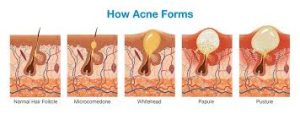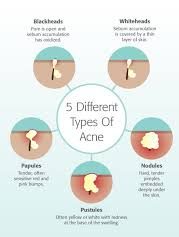Acne is a common skin condition, especially in teens, that impacts appearance and confidence but can be managed by understanding its causes and prevention.
Acne is a very prevalent skin condition that occurs in people of all ages but is most common during adolescence. Although it is usually regarded as a cosmetic issue, acne also affects a person’s self-perception and overall quality of life. Knowing the causes of acne and how to avoid it can assist people in effectively managing this illness.
What Is Acne?

Acne is a type of skin disease that results from hair follicles being blocked with oil (sebum), dead skin cells, and in some cases, bacteria. This creates pimples, blackheads, whiteheads, cysts, or nodules. Acne may be on the face, neck, chest, back, shoulders, or even upper arms.
The severity of acne differs from one individual to another, and some of them have occasional outbreaks, while others get chronic acne, which lasts for several years. It is crucial to understand that acne is a medical disorder, and proper treatment is the key to its control.
Causes of Acne
A number of causes can contribute to acne, and most times, it is a mix of the same. Common reasons are:
Hormonal Fluctuations: Fluctuations in hormones at puberty, menstruation, pregnancy, or with the use of birth control pills may result in the increased production of oil, thus acne. Androgens (male hormones in men and women) significantly cause the stimulation of sebaceous glands to increase the production of oil.
Increased Production of Sebum: Sebaceous glands make sebum in order to lubricate and nourish the skin. But if sebum is made in excess, it gets lodged in the pores and forms spots.
Clogged pores: Dead skin cells that gather within the hair follicles may commingle with sebum to build a plug which provides an incubator for the growth of bacteria. Inflamed acne lesions may develop due to this process.
Bacterial Growth: Propionibacterium acnes or P. acnes is a bacterium which resides on the skin and may be responsible for causing acne. When pores are blocked, P. acnes may grow and cause infection, inflammation, and formation of pustules or cysts.
Genetics: Genetics also have a part to play in acne. If your parents suffered from acne, you are likely to develop it too.
Types of Acne

Acne exists in many forms, from mild to severe:
Comedones: These are lesions that are not inflammatory, including blackheads (open comedones) and whiteheads (closed comedones), which occur when pores are plugged with dead skin cells and sebum.
Papules: Small, inflamed, red bumps on the skin, typically under 5mm in size.
Pustules: They are like papules but with pus inside them, which makes them yellow or white.
Cysts and Nodules: These are larger, more tender bumps that form deeper in the skin and can cause scarring.
Tips for Preventing Acne
Although it is not possible to entirely avoid acne, there are things you can do to reduce your chances of breakouts:
Clean Gently: Wash your face twice daily with a mild cleanser to clear away excess oil, dirt, and makeup. Do not scrub the skin too vigorously, as this will irritate and aggravate acne.
Don’t Touch Your Face: Picking, squeezing, or touching your face can bring bacteria and irritate the skin, causing more breakouts.
Use Non-Comedogenic Products: Select foundation, moisturizer, and sunscreens that say “non-comedogenic,” which means that they are less likely to cause pores to become clogged.
Stay Stress-Free: Stress can cause acne flare-ups, so look into activities like yoga, meditation, or exercise to keep stress levels in check.
Eat a Healthy Diet: Although the relationship between diet and acne is still under investigation, eating a balanced diet with fruits, vegetables, and whole grains can contribute to healthy skin.
Diet Plan for Clearer Skin

A balanced diet is essential for healthy skin. Here’s an easy-to-follow diet plan to control acne:
Breakfast: Whole wheat toast with avocado and a boiled egg; Green smoothie made with spinach, cucumber, and apple.
Lunch: Grilled tofu or chicken with a quinoa salad (add spinach, olive oil, and tomatoes); A serving of fresh fruits (such as berries).
Dinner: Baked salmon or a vegetarian protein with steamed broccoli; Sweet potatoes or brown rice.
Snacks: A serving of almonds or walnuts; Carrot sticks with hummus; Greek yogurt (unsweetened) with a drizzle of honey.
Foods to Avoid: High-glycemic foods (like white bread, sweet snacks, and soft drinks), Dairy products, Fried and processed foods.
How Our Product Can Help with Acne

While natural treatments and diet adjustments can help, sometimes additional care is needed for more effective acne treatment. Our product is designed specifically for individuals struggling with acne, offering a combination of natural and scientifically-backed ingredients that address the root causes of acne.
Why Our Product Is the Best Solution for Acne:
- Strong But Gentle: Our product has ingredients such as tea tree oil, aloe vera, and green tea extract, which are famous for their antibacterial and anti-inflammatory properties, preventing breakouts without irritating the skin.
Non-Comedogenic: Our formula is designed to be non-comedogenic, meaning it won’t clog your pores, a common cause of acne.
Encourages Clear, Healthy Skin: Our product’s blend of vitamins, antioxidants, and anti-inflammatory agents facilitates the natural healing of the skin and minimizes redness and irritation.
Good for All Skin Types: No matter whether you have oily, sensitive, or combination skin, our product is safe for everyday use and offers effective, gentle acne relief.
Visible Results: Customers notice visible improvement in acne within a few weeks of regular usage. It decreases acne and helps prevent future occurrences, making your skin smoother and clearer.Goodbye acne, hello clearer, healthier skin! Use our acne treatment solution today and see the difference for yourself!